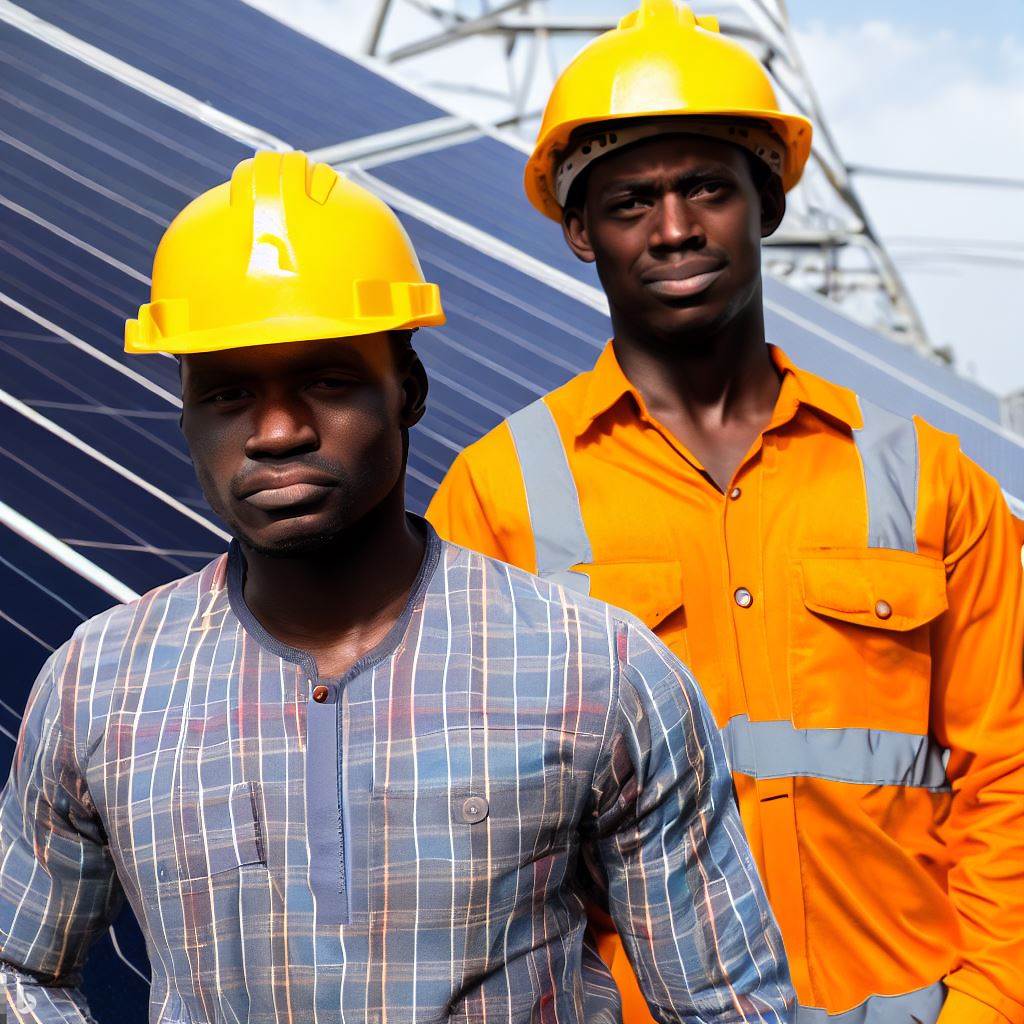Introduction
Definition of Solar PV Industry
Let’s talk about solar PV industry growth.
Solar photovoltaic (PV) industry refers to the production and utilization of solar panels to convert sunlight into electricity.
Importance of solar energy
Solar energy is crucial as it provides clean, renewable, and sustainable power without contributing to pollution or climate change.
Brief overview of Nigeria’s solar PV industry growth outlook
Nigeria’s solar PV industry has great potential for growth due to its abundant solar resources, increasing energy demand, and government support.
Current State of Nigeria’s Solar PV Industry
Overview of Nigeria’s energy sector
- Nigeria’s energy sector heavily relies on fossil fuels, particularly oil and gas.
- However, the country has abundant solar resources, making solar PV a promising renewable energy alternative.
- The electricity generation capacity in Nigeria is insufficient to meet the growing demand.
- Access to electricity is limited, especially in rural areas, hindering economic growth and development.
Challenges faced by the solar PV industry in Nigeria
- Lack of adequate funding and investment opportunities for solar PV projects.
- Inadequate infrastructure, such as transmission and distribution networks, restricts the expansion of solar PV systems.
- Policy and regulatory barriers make it difficult for solar PV developers to operate in Nigeria.
- Low public awareness and misconceptions about solar energy hinder its widespread adoption.
Government initiatives and policies promoting solar energy in Nigeria
- The Nigerian government has recognized the potential of solar energy and has taken steps to promote its use.
- The Renewable Energy Master Plan (REMP) aims to increase the share of renewable energy in Nigeria’s energy mix.
- The Rural Electrification Agency (REA) has launched programs to deploy solar PV systems in rural communities.
- The Solar Power Naija project aims to provide millions of Nigerians with access to electricity through solar mini-grids.
- The government has implemented tax incentives and tariff reductions to encourage investment in solar energy.
- The Nigerian Electricity Regulatory Commission (NERC) has introduced feed-in tariffs to incentivize solar PV generation.
- The Off-Grid Electrification Strategy aims to accelerate the deployment of off-grid solar systems in Nigeria.
In general, Nigeria’s solar PV industry has a growth outlook despite the challenges it faces.
The country’s energy sector heavily relies on fossil fuels, but the abundance of solar resources presents an opportunity for renewable energy expansion.
The insufficient electricity generation capacity and limited access to electricity further highlight the need for alternative sources like solar PV.
However, the industry faces challenges such as inadequate funding, infrastructure limitations, and policy barriers.
To address these issues, the Nigerian government has implemented initiatives and policies to promote solar energy, including the Renewable Energy Master Plan, rural electrification programs, and tax incentives.
These efforts aim to increase investment, overcome regulatory barriers, and accelerate the adoption of solar PV systems.
With continued government support and increased awareness, Nigeria’s solar PV industry can contribute significantly to the country’s energy transition and sustainable development.
Factors Driving the Growth of Nigeria’s Solar PV Industry
Several factors drive the growth of Nigeria’s solar PV industry:
- Abundant Solar Resources: Nigeria’s location in the Sun Belt region ensures ample solar radiation year-round.
- Energy Demand and Rural Access: Increasing energy needs and limited rural electricity access fuel demand for solar.
- Cost-Effective Technology: Declining solar PV costs make it a competitive energy option.
- Private Sector Investments: Investments boost industry growth, aided by government policies like tax incentives and tariff reductions.
Private sector involvement extends to local manufacturing, creating jobs and technology transfer opportunities.
In essence, Nigeria’s solar PV sector thrives due to abundant resources, rising energy demand, cost competitiveness, and private sector investments.
Read: Local Ingredients Chefs Love in Nigerian Cooking
Opportunities in Nigeria’s Solar PV Industry
Job creation and economic development
The growth of Nigeria’s solar PV industry presents several opportunities for job creation and economic development.
- Increased demand for solar PV installations will lead to the need for more skilled workers such as solar panel technicians, installers, and maintenance personnel.
- The establishment of solar PV manufacturing facilities will create job opportunities in the production sector, including assembly line workers and engineers.
- Local businesses will benefit from the growth of the solar PV industry by providing support services such as financing, logistics, and marketing.
- The influx of investment in the solar PV sector will stimulate economic growth, attracting both domestic and foreign investors.
- Job creation in the solar PV industry can help reduce unemployment rates and contribute to poverty alleviation.
Increased access to electricity in remote areas
Nigeria’s solar PV industry offers the chance to extend electricity access to remote and underserved areas.
- Remote communities that are not connected to the national grid can benefit from standalone solar PV systems, allowing them to have access to clean and reliable electricity.
- Solar mini-grids can be set up to power entire communities, providing electricity for residential, commercial, and public uses.
- Increased electricity access in remote areas can enhance education, healthcare, and communication services, leading to social and economic development.
- The solar PV industry can help bridge the energy access gap and reduce the disparity between urban and rural areas in terms of electricity availability.
- By enabling access to electricity in remote areas, the solar PV industry can contribute to poverty reduction and improve the quality of life for millions of Nigerians.
Transition towards renewable energy and reduced environmental impact
The growth of Nigeria’s solar PV industry promotes the transition to renewable energy sources and mitigates the environmental impact of fossil fuels.
- Solar PV power generation reduces the country’s dependence on fossil fuels, contributing to energy diversification and energy security.
- The use of solar PV systems decreases greenhouse gas emissions, helping Nigeria fulfill its commitments under the Paris Agreement and combat climate change.
- The adoption of renewable energy sources like solar PV reduces air pollution and improves environmental quality, benefiting public health.
- The solar PV industry aligns with Nigeria’s goal to increase the share of renewable energy in the country’s energy mix and achieve sustainable development.
- The decreased reliance on fossil fuels through the growth of the solar PV industry can lead to positive environmental and social impacts, including reduced deforestation and improved air quality.
In a nutshell, the opportunities presented by Nigeria’s solar PV industry are vast.
This sector has the potential to create jobs, stimulate economic growth, expand access to electricity in remote areas, and contribute to the transition towards a sustainable and environmentally friendly energy system.
By embracing these opportunities, Nigeria can reap the benefits of solar PV and pave the way for a brighter and greener future.
Read: Political Science Journals and Publications in Nigeria
Government Support and Regulations
Incentives and subsidies for solar PV projects
- Solar Home System (SHS) program aids off-grid communities with solar PV installation.
- Tax exemptions and waivers encourage solar energy investments, reducing implementation costs.
Regulatory frameworks and policies supporting solar energy development
- Nigerian Electricity Regulatory Commission (NERC) implements Feed-in Tariff (FiT) system for fair pricing.
- National Renewable Energy and Energy Efficiency Policy (NREEEP) sets renewable energy integration targets.
Collaboration with international organizations and partnerships
- Partnerships with organizations like IRENA, the World Bank, and UNDP bring expertise and funding.
- Participation in regional initiatives like the West African Power Pool (WAPP) promotes cross-border electricity trade and solar projects.
Read: Political Scientists and NGOs: Partnerships in Nigeria

Challenges and Obstacles
In order for Nigeria’s solar PV industry to achieve its full potential, it must navigate several challenges and obstacles.
These hurdles pose significant barriers to the growth and development of the industry as a whole.
Limited infrastructure and transmission capacity
One of the major challenges faced by Nigeria’s solar PV industry is the limited infrastructure for electricity generation and transmission.
The country’s existing power grid is inadequate and often unable to handle the additional capacity generated by solar PV systems.
This results in a lack of reliable access to electricity, undermining the potential benefits of solar energy.
Issues related to financing and access to funding
Another obstacle hindering the growth of Nigeria’s solar PV industry is the lack of financing options and limited access to funding.
Many potential investors and project developers face difficulties in securing the necessary capital to implement solar PV projects.
The high upfront costs associated with solar installations and the uncertainty surrounding returns on investment are deterrents for both local and international investors.
Lack of awareness and technical expertise
A major challenge is the lack of awareness and technical expertise within the country. Many Nigerians are unaware of the potential benefits of solar energy and the opportunities it presents.
This lack of knowledge and understanding hinders the widespread adoption of solar PV systems.
Additionally, there is a shortage of skilled professionals with the technical expertise required for designing, installing, and maintaining solar PV systems.
Policy implementation and enforcement difficulties
While Nigeria has made progress in developing policies and regulations to promote solar energy, there are challenges in their implementation and enforcement.
Inconsistent enforcement and slow bureaucratic processes create uncertainties for investors and project developers.
Clear and transparent policies, along with effective enforcement mechanisms, are crucial to instill confidence in the solar PV industry, attract investments, and foster growth.
In fact, Nigeria’s solar PV industry faces several challenges and obstacles that must be addressed to unlock its full potential.
These include limited infrastructure and transmission capacity, issues related to financing and access to funding, lack of awareness and technical expertise, as well as policy implementation and enforcement difficulties.
Overcoming these hurdles will require concerted efforts from the government, investors, and industry stakeholders.
By addressing these challenges, Nigeria can accelerate the growth of its solar PV industry and contribute to a more sustainable and energy-secure future.
Read: Public Perception of Political Scientists in Nigeria
Case Studies of Successful Solar PV Projects in Nigeria
Off-grid solar installations in rural communities
- In the rural community of Kwara, Nigeria, a solar PV company installed off-grid systems to provide electricity to homes and businesses.
- This project brought significant improvements to the lives of the community members, enabling access to clean and reliable electricity.
- With the availability of electricity, small businesses flourished, leading to economic growth and improved standards of living.
- The off-grid solar installations in Kwara proved to be a sustainable solution in bridging the energy gap in rural areas of Nigeria.
Solar-powered public facilities
- A shining example of solar PV success in Nigeria is the installation of solar panels in public facilities such as schools and hospitals.
- In Lagos, solar-powered streetlights were installed, enhancing security and ensuring safer streets for residents.
- The use of solar energy in public facilities has significantly reduced electricity costs and dependence on the grid.
- These projects demonstrate the government’s commitment to renewable energy and its positive impact on public services.
Large-scale solar PV projects in Nigeria
- The success of large-scale solar PV projects in Nigeria is exemplified by the Qua Iboe Power Plant in Akwa Ibom state.
- With a capacity of 540 MW, this plant is one of the largest solar PV installations in Africa, supplying electricity to millions of Nigerians.
- The Qua Iboe Power Plant has greatly contributed to the nation’s energy mix, reducing reliance on fossil fuels and decreasing carbon emissions.
- This project has showcased Nigeria’s potential as a leader in solar energy generation and attracted international investors to the country.
In short, Nigeria’s solar PV industry has witnessed tremendous growth, as evident from successful case studies.
Off-grid solar installations have brought electricity to rural communities, empowering businesses and enhancing quality of life.
Solar-powered public facilities have improved services while reducing costs and dependence on the grid. Large-scale solar PV projects have showcased Nigeria’s potential and attracted international investments.
The country’s commitment to renewable energy is setting it on a path towards a sustainable and greener future.
Future Outlook and Projections
Nigeria, with its abundant sunlight, has immense growth potential in the solar PV industry.
Growth potential of Nigeria’s solar PV industry
- The Nigerian government’s commitment to renewable energy provides a favorable environment for industry growth.
- Investment in solar PV infrastructure is expected to increase, driven by the need for clean and sustainable energy sources.
- Improved efficiency and declining costs of solar PV technology will further attract investments.
- The potential for job creation in the sector will contribute to the country’s economic development.
Projected investments and market trends
- Projections indicate that investment in Nigeria’s solar PV industry will reach billions of dollars in the coming years.
- The market is expected to grow at a significant rate, driven by increasing electricity demand and favorable government policies.
- Private sector participation and foreign direct investments are likely to play a crucial role in market expansion.
- Technological advancements, such as energy storage solutions, will further enhance the attractiveness of the solar PV market.
Potential for international collaborations and partnerships
- Nigeria’s solar PV industry presents an excellent opportunity for international collaborations and partnerships.
- Developed countries with expertise in solar PV technology can support Nigeria in capacity building and knowledge transfer.
- Joint ventures between Nigerian and international companies can facilitate technology transfer and promote local manufacturing capabilities.
- International financing institutions can provide funding and assistance for large-scale solar PV projects in Nigeria.
Most importantly, Nigeria’s solar PV industry holds significant growth potential, supported by favorable government policies, increasing investments, and market trends.
The country’s abundant sunlight resources and the need for sustainable energy sources create a conducive environment for industry development.
As the industry expands, it is crucial to leverage international collaborations and partnerships to tap into expertise, technology transfer, and financing opportunities.
With a promising future outlook, Nigeria can harness the power of solar PV to meet its growing energy needs and contribute to national economic development.
Explore Further: Emerging Tech in Solar PV: Nigeria’s Adoption
Conclusion
Recap of key points discussed
- The Nigerian solar PV industry has experienced significant growth in recent years.
- Several factors, such as government initiatives and decreasing costs, have contributed to this growth.
- Foreign investments and partnerships have played a crucial role in the development of the sector.
- The establishment of solar PV farms and off-grid solutions has increased access to electricity.
- The potential for job creation and economic development in Nigeria’s solar industry is immense.
Importance of harnessing Nigeria’s solar PV industry for sustainable development
- Utilizing solar energy can help reduce Nigeria’s dependence on fossil fuels and improve energy security.
- Increased access to electricity can improve the standard of living for rural communities.
- Solar PV solutions can contribute to the reduction of greenhouse gas emissions, combating climate change.
- The solar sector has the potential to attract foreign investments and boost economic growth.
Hope for a bright future in Nigeria’s solar energy sector
- With ongoing government support and favorable policies, the solar industry is expected to continue growing.
- Advancements in technology will further enhance the efficiency and affordability of solar PV systems.
- Collaboration between international and domestic stakeholders can drive innovation and knowledge sharing.
- Nigeria has the potential to become a regional leader in solar energy and achieve sustainable development goals.
When all is said and done, Nigeria’s solar PV industry presents exciting opportunities for sustainable development, economic growth, and improved livelihoods.
By harnessing its vast solar resources, Nigeria can achieve energy security, reduce greenhouse gas emissions, and enhance its position in the global clean energy market.




